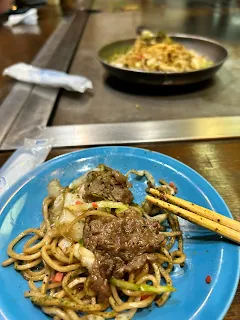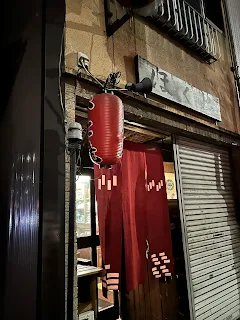First Blog Post: On the way to Japan Tokyo -Day 1
Second Blog Post : On the way to Japan - visiting Fuji-san
Third Blog Post: Tour to Mount Hakone and Ashi Lake
I've written about Japanese food, specifically breakfast, before, but I didn't go into much detail, so I decided to write this article. We usually eat at places where locals eat, rather than tourist-only spots. In Venice, Italy, for instance, we realized that the food at local places is really delicious.
One evening in Tokyo, we went to a small restaurant run by a Malaysian-Chinese woman , thinking it was a Japanese place. There, we met another Malaysian-Chinese man, struck up a conversation, and drank two Asahi beers. The Malaysian-Chinese man said that in Malaysia, they are treated as "second class," while the Bumiputras (indigenous Malays) receive better treatment. That's why he came to Japan. His family and home are in Malaysia, and he sends money there. I don't know if it's true or false.
This restaurant had large bottles of sake. You could buy them, drink a portion, and if you couldn't finish it, you could leave it there. They'd label it with your name. You could then come back another day and drink it. It's a great way to keep customers coming back. Those bottles on top of the fridge are examples of that. We ate something like noodles there.
This is the bluefin tuna dish Ines had.
We spoke with the Chinese girl who was nearby. She said she was there for two months for work and would be leaving soon, but planned to return for a longer stay next time because she loves Japan so much.
While in Japan, something our European guides mentioned is that Japanese work long hours and people are struggling. They work late into the night, which leads to a higher suicide rate. Although I plan to discuss this at length later, it's worth noting that when it comes to suicide rates, countries like India, Russia, Sri Lanka, the United States, Finland (the happiest country), Burkina Faso, and Sweden rank above Japan. Japan is 49th, while Britain is 117th. Japan has a custom called Harakiri, where samurai commit suicide if they are defeated, considering it an act of honor. During World War II, Kamikaze pilots also died by suicide. If a Japanese person is unemployed or has no work, it's considered a dishonor, and committing suicide is seen as an honorable act. This is the exact opposite of the European perspective.
We then told them to order us the same thing. The Tasmanian couple translated that for us and then said goodbye and left. Even foreign tourists help each other in Japan.
The little cafe could only seat about seven or eight people. The person with their back turned is the cafe owner Hikido.
We chatted with the old lady (the owner). She said she was happy to work until 10 PM. Friends come to talk and eat (we saw that). Otherwise, she felt her life would be meaningless, that's how we understood her words.
This is how you eat by cutting with a crepe spade type thing here.
They say one reason people on Okinawa island live over a hundred years is that they consume less salt than other parts of Japan. The second reason identified by scientists who surveyed them is working. Even after retirement, they find some kind of work to do.
The third factor is socializing with others, maintaining community or social connections.
























No comments:
Post a Comment